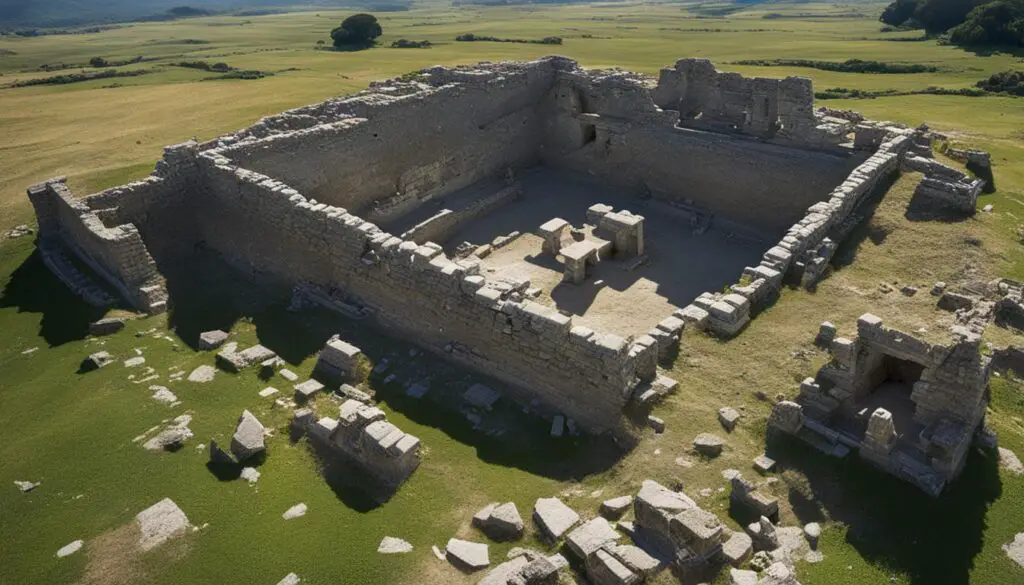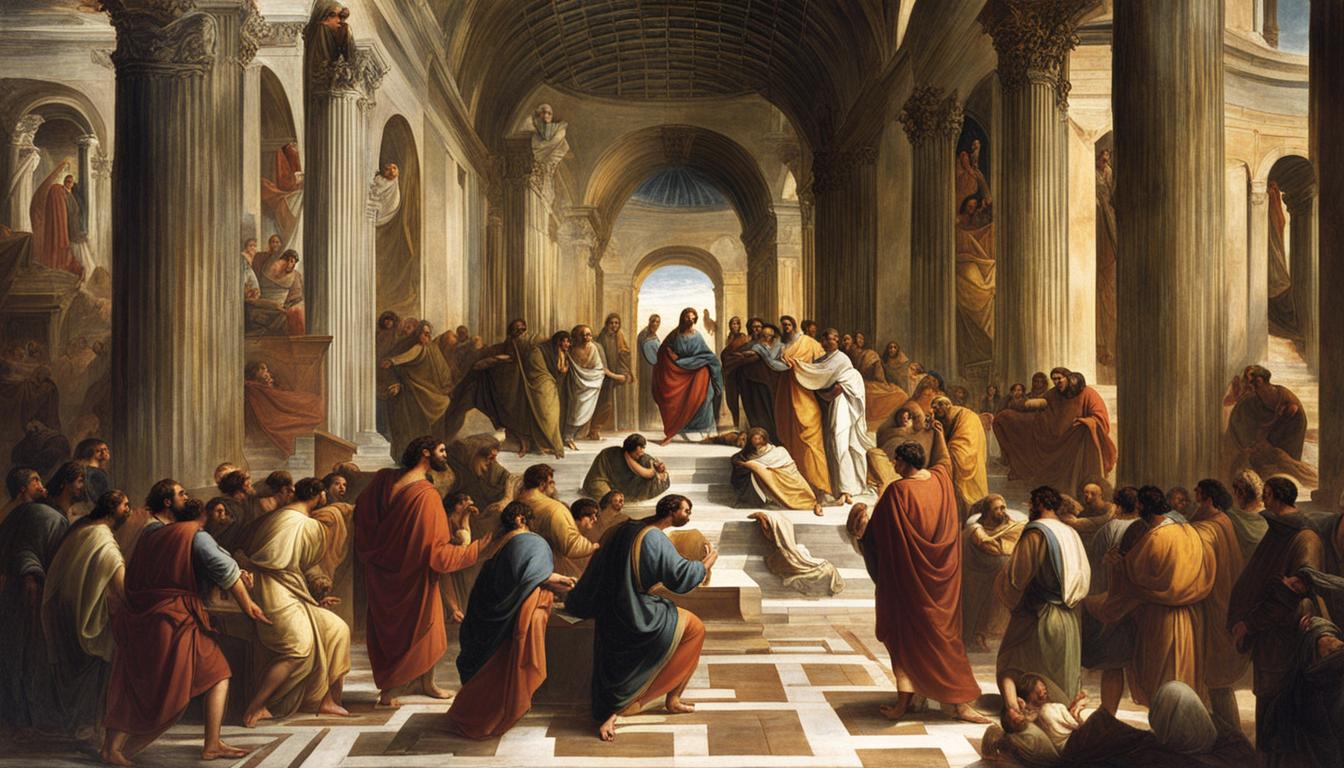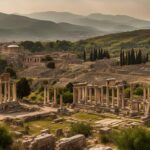Welcome to our in-depth exploration of the history of the Philippian Church, a significant cornerstone of early Christianity. Founded by the Apostle Paul during his second missionary journey, this church in Philippi holds immense biblical and historical importance. Join us as we delve into its foundation, key beliefs, significant events, influence and impact, structure and governance, notable figures, and its current status and future outlook.
Key Takeaways:
- The Philippian Church holds significant historical and biblical importance in early Christianity.
- Founded by the Apostle Paul during his second missionary journey, it offers valuable insights into the faith and teachings of that time.
- The church in Philippi was established around 49-50 CE in the city of Philippi, located in Macedonia, Greece.
- Paul’s Epistle to the Philippians, written during his imprisonment in Rome, has immense theological significance.
- Despite challenges, the church in Philippi played a vital role in the spread of Christianity through its growth and perseverance.
Foundation and Establishment of the Church in Philippi
Paul’s visit to Philippi in 49-50 CE marked the foundation of the church in this Macedonian city. Inspired by a vision in Troas, where a Macedonian man implored him to come and help, Paul embarked on a journey that would shape the history of early Christianity. Accompanied by Silas, Timothy, and Luke, Paul arrived in Philippi, and it was here that the key figures in the establishment of the church would emerge. Philippian Church
One such figure was Lydia, a businesswoman who played a significant role in the development of the Philippian church. As the first recorded convert, Lydia welcomed Paul and his companions into her home, offering them hospitality and support. Her home in Philippi became a base for their ministry, and her conversion marked the beginning of a thriving Christian community in the city. Christian history
The foundation and establishment of the church in Philippi set the stage for the growth and spread of Christianity in the region. The faith of Lydia and the early believers, coupled with Paul’s teachings and guidance, laid a solid foundation for the Philippian church to flourish and leave an enduring impact on the history of Christianity. early Christianity
“The church in Philippi was founded during Paul’s visit to the city in 49-50 CE.”
Historical Events and Significance of Paul’s Epistle to the Philippians
One of the significant historical events in the early Philippian church was the imprisonment of the Apostle Paul. This event had a profound impact on the church and its members. Paul’s imprisonment served as a powerful witness to the faith and endurance of the Philippian believers, inspiring them to stand firm in their convictions and continue spreading the message of Christianity. biblical history
During his imprisonment, Paul wrote a letter to the Philippians, known as the Epistle to the Philippians. This letter holds immense significance in the Christian faith and provides valuable insights into the teachings and beliefs of the early church. The Epistle to the Philippians is a letter of gratitude and encouragement, expressing Paul’s deep affection for the Philippian believers and his desire for their spiritual growth and unity. historical background
“I thank my God every time I remember you. In all my prayers for all of you, I always pray with joy because of your partnership in the gospel from the first day until now.” – Philippians 1:3-5
The Epistle to the Philippians addresses various theological and practical matters, emphasizing the themes of joy, humility, unity, and Christian living. It offers guidance on facing challenges, maintaining a Christ-centered mindset, and growing in spiritual maturity. Paul’s words of wisdom and encouragement continue to resonate with believers today, providing timeless guidance and inspiration. church development
The significance of Paul’s Epistle to the Philippians lies not only in its historical context but also in its relevance to modern Christians. It reminds believers of the importance of joy, gratitude, and unity in their faith journey. The letter serves as a source of encouragement and instruction, urging Christians to live in a manner worthy of the gospel and to persevere amidst trials and difficulties.

Table: Key Themes in Paul’s Epistle to the Philippians
| Themes | Key Verses |
|---|---|
| Joy and Rejoicing | “Rejoice in the Lord always. I will say it again: Rejoice!” – Philippians 4:4 |
| Humility | “Do nothing out of selfish ambition or vain conceit. Rather, in humility value others above yourselves.” – Philippians 2:3 |
| Unity and Love | “Make my joy complete by being like-minded, having the same love, being one in spirit and of one mind.” – Philippians 2:2 |
| Pressing Forward | “I press on toward the goal to win the prize for which God has called me heavenward in Christ Jesus.” – Philippians 3:14 |
| Contentment | “I have learned to be content whatever the circumstances.” – Philippians 4:11 |
Growth and Development of the Church in Philippi
The church in Philippi experienced remarkable growth and development despite facing numerous challenges. From its humble beginnings as a small group of believers, the church grew in numbers and influence, ultimately playing a significant role in the spread of Christianity in the region. The unwavering faith and dedication of the Philippian Christians were pivotal in their ability to overcome obstacles and make a lasting impact.
Challenges Faced
The growth of the church in Philippi was not without its challenges. The early Christians faced persecution from both the Jewish community and the Roman authorities, who viewed Christianity as a threat to their power and control. Additionally, the city of Philippi was a melting pot of different cultures and religions, making it challenging for the church to maintain its distinct identity amidst competing ideologies and practices.
Influence on the Spread of Christianity
Despite these challenges, the church in Philippi had a significant influence on the spread of Christianity in the region. The Philippian Christians were actively engaged in sharing the good news, not only within their city but also in neighboring communities. Their commitment to the teachings of Jesus Christ and their unwavering faith served as a powerful testimony to the transformative power of the gospel. As a result, many individuals were drawn to the message of Christianity and embraced the faith, leading to the establishment of new churches and the expansion of the Christian movement.
| Challenges Faced | Influence on the Spread of Christianity |
|---|---|
| Persecution from Jewish community and Roman authorities | Commitment to teachings of Jesus Christ |
| Competition with other religions and ideologies in Philippi | Unwavering faith and powerful testimony |
| Establishment of new churches and expansion of Christian movement |
Structure and Governance of the Philippian Church
The Philippian church, although the exact details of its organizational structure are not explicitly stated in the biblical texts, functioned under a specific structure and governance. It can be inferred that the church had leaders and elders who provided guidance and oversight. The letter to the Philippians mentions leaders such as Epaphroditus and encourages unity and submission to those in authority. The leadership within the church played a crucial role in maintaining order, fostering spiritual growth, and ensuring the faithful adherence to Christian teachings.
While the Philippian church operated under the guidance of the Apostle Paul and his companions, they also had a sense of autonomy in their decision-making processes. The leaders were responsible for interpreting and applying the teachings of Paul, ensuring that the church remained faithful to the core beliefs and doctrines of early Christianity. They held a position of influence and were instrumental in providing pastoral care, resolving conflicts, and addressing the spiritual needs of the congregation.
It is important to note that the structure and governance of the Philippian church were not rigid and hierarchical but rather characterized by a spirit of cooperation and mutual submission. The emphasis on unity and humility within the church community promoted a sense of equality among its members. This inclusive and collaborative approach allowed for the active participation of all believers and fostered a strong sense of community and shared responsibility.
| Church Structure | Governance | Leadership |
|---|---|---|
| Leaders and elders overseeing the church | Autonomous decision-making within the church | Epaphroditus and other leaders mentioned in the letter to the Philippians |
| Ensuring order and spiritual growth | Interpreting and applying teachings of Paul | Providing pastoral care and resolving conflicts |
| Characterized by unity and humility | Promoting equality and active participation | Fostering a sense of community and shared responsibility |
The structure and governance of the Philippian church offer valuable insights into the early Christian community and provide a model for church organization and leadership today. The emphasis on unity, humility, and mutual submission serves as a reminder of the importance of these virtues in fostering a healthy and thriving church community. The Philippian church’s commitment to effective leadership, spiritual growth, and shared responsibility continues to inspire and guide believers in their journey of faith.
Notable Figures in the History of the Philippian Church
Two notable figures in the history of the Philippian church are Lydia and the Philippian jailer. Their stories and contributions play a significant role in understanding the development and impact of this early Christian community.
The Faithful Convert: Lydia
Lydia, a businesswoman and devout worshiper of God, played a crucial role in the establishment of the church in Philippi. As the first recorded convert, her encounter with the Apostle Paul had a profound impact on the growth and development of the Philippian church. Lydia’s hospitality and generosity were instrumental in providing a base for Paul and his companions’ ministry. Her conversion and subsequent involvement in the church demonstrated the transformative power of the gospel.
A Life Transformed: The Philippian Jailer
The Philippian jailer and his household were another significant convert in the city. During Paul and Silas’ imprisonment, an earthquake shook the prison, causing the doors to open. Fearing that the prisoners had escaped, the jailer was about to take his own life when Paul assured him that they were all still there. This dramatic turn of events led to the jailer’s conversion and baptism, marking a transformative moment for both him and the Philippian church.
Impact and Significance
Both Lydia and the Philippian jailer’s conversions not only demonstrate the power of God’s grace but also serve as examples of the diverse individuals who found a home within the Philippian church. Their faith and experiences contributed to the church’s growth and strengthened its impact on the community. Furthermore, the stories of Lydia and the Philippian jailer continue to inspire believers today, reminding us of the transformative nature of encountering the gospel and the enduring legacy of the early Christian church in Philippi.
Current Status and Future Outlook of the Philippian Church
The Philippian church, despite its ancient origins, continues to hold great significance and relevance in contemporary times. The lessons and principles derived from the history of the Philippian church offer valuable guidance and inspiration for modern Christians.
The unwavering faith demonstrated by the early believers in Philippi serves as a powerful example for Christians today. Their commitment to the gospel amidst persecution and societal pressure reminds us of the importance of standing firm in our convictions and boldly proclaiming our faith.
The Philippian church also teaches us about the value of sacrificial giving and joyful perseverance. Their financial support of Paul’s mission and their willingness to endure hardships for the sake of Christ demonstrate the transformative power of selfless love and service.
The contemporary relevance of the Philippian church lies in its embodiment of unity, humility, and spiritual disciplines. The call to be united as one body in Christ, to embrace humility, and to cultivate a vibrant spiritual life is as applicable today as it was in the early days of the church in Philippi.
The Philippian Church’s Lessons for Modern Christians:
- Stand firm in faith and boldly proclaim the gospel
- Practice sacrificial giving and selfless love
- Persevere joyfully in the face of trials
- Embrace unity and humility in the body of Christ
- Cultivate a vibrant spiritual life through prayer, worship, and the study of God’s Word
The enduring impact of the Philippian church on Christianity serves as a reminder of the timeless truths and values that underpin the Christian faith. As modern Christians, we can draw inspiration from their example and apply these lessons to navigate the challenges and opportunities of our own time.

| Lessons for Modern Christians | Key Takeaways |
|---|---|
| Stand firm in faith and boldly proclaim the gospel | Be confident in your beliefs and share the message of Christ with courage and conviction. |
| Practice sacrificial giving and selfless love | Give generously of your time, resources, and love to serve others and advance God’s kingdom. |
| Persevere joyfully in the face of trials | Find strength and joy in Christ, knowing that He is with you in every circumstance. |
| Embrace unity and humility in the body of Christ | Seek harmony with fellow believers, valuing their unique contributions and humbly serving one another. |
| Cultivate a vibrant spiritual life through prayer, worship, and the study of God’s Word | Nourish your relationship with God through regular prayer, worship, and meditation on Scripture. |
Archaeological Discoveries in Philippi
The ancient city of Philippi has been the site of numerous archaeological excavations, uncovering fascinating insights into the history and significance of the Philippian church. These discoveries provide tangible evidence of the city’s existence and its role in early Christianity. Remnants of the ancient city have been unearthed, shedding light on the cultural and historical context in which the church thrived.
One significant discovery is the Roman forum, which served as the center of political, social, and economic activities in Philippi. The forum’s remains offer a glimpse into the city’s bustling life during the time of the Philippian church. Inscriptions found in and around the forum provide valuable information about the local administration, political figures, and public events that took place.

Another exciting find is a possible prison believed to be the location where the Apostle Paul and Silas were held captive. This discovery aligns with biblical accounts of their imprisonment and adds historical authenticity to the events described in the Book of Acts. The prison serves as a poignant reminder of the hardships and persecution endured by early Christians and the unwavering faith that sustained them.
These archaeological findings not only confirm the historicity of Philippi but also provide a tangible connection to the Philippian church’s history. They offer a glimpse into the daily lives of the early believers, their challenges, and their dedication to spreading the gospel. The discoveries in Philippi continue to enhance our understanding of the New Testament era and its profound impact on the development of Christianity.
Conclusion
The church in Philippi holds a rich legacy that has had an enduring impact on Christianity. From its foundation and establishment by the Apostle Paul to its significant historical events, the Philippian church played a vital role in the spread and development of early Christianity.
Despite facing challenges such as persecution and opposition, the church in Philippi experienced remarkable growth and remained steadfast in their faith. Their unwavering commitment to unity, humility, and sacrificial giving serves as an inspiration for modern Christians.
The structure and governance of the Philippian church, though not explicitly detailed in biblical texts, highlight the importance of leadership and submission to authority within the Church. Notable figures such as Lydia and the Philippian jailer played crucial roles in the establishment and growth of the church, their conversions serving as powerful testimonies to the transformative power of the gospel.
Today, the legacy of the Philippian church continues to inspire and guide believers. The enduring impact of their faith and teachings reminds us of the strength and endurance of the body of Christ. The church in Philippi offers valuable lessons for contemporary Christians, emphasizing the importance of unity, humility, and perseverance in the face of trials.
FAQ
What is the historical significance of the Philippian Church?
The Philippian Church holds significant historical and biblical importance, as it was founded by the Apostle Paul during his second missionary journey. It played a vital role in the development and spread of early Christianity, offering valuable insights into the faith and teachings of that time.
When and how was the church in Philippi established?
The church in Philippi was founded during Paul’s visit to the city in 49-50 CE. He was motivated to visit Philippi after receiving a vision in Troas, where a Macedonian man implored him to come and help them. Key figures involved in the establishment were Paul, Silas, Timothy, and Luke. Lydia, a businesswoman, played a crucial role as the first recorded convert.
What role did Paul’s Epistle to the Philippians play in the church’s history?
Paul’s Epistle to the Philippians, believed to be written during his imprisonment in Rome, holds immense significance. It is a letter of gratitude, encouragement, and profound theological insights, providing valuable teachings on joy, humility, and unity. It had a profound impact on the church, strengthening their faith and serving as a powerful witness to others.
What were some challenges faced by the church in Philippi?
The church in Philippi faced challenges such as persecution, societal pressure, and opposition from false teachers. However, they remained steadfast and continued to thrive, actively participating in spreading the good news. Their financial support of Paul’s mission and their perseverance became a powerful testimony to the transformative power of the gospel.
How was the Philippian Church structured and governed?
While the exact details of their organizational structure are not explicitly stated in the biblical texts, it can be inferred that there were leaders and elders overseeing the church. The letter to the Philippians mentions leaders such as Epaphroditus and encourages unity and submission to those in authority. Paul and his companions provided spiritual leadership and oversight.
Who were some notable figures in the history of the Philippian Church?
Lydia, a businesswoman and devout worshiper of God, played a crucial role in the establishment of the church as the first recorded convert. Her hospitality and generosity were instrumental in the early growth of the church. The Philippian jailer and his household were also important converts, and their conversion experience, which occurred during Paul’s imprisonment, had a profound impact on the church.
What can contemporary believers learn from the Philippian Church?
The unwavering faith, sacrificial giving, and joyful perseverance of the Philippian Church serve as an example for Christians today. Their commitment to unity, humility, and spiritual disciplines reminds us of the importance of these virtues in our own lives and within the Church. The history of the Philippian Church continues to inspire and guide believers in their faith.
What archaeological discoveries have been made in Philippi?
Archaeological excavations in Philippi have provided valuable insights into the historical and cultural context of the church. Remnants of the ancient city, including the Roman forum, inscriptions, and a possible prison where Paul and Silas were held, have been unearthed. These discoveries confirm the historicity of Philippi and its significance in early Christianity.
What is the current status and future outlook of the Philippian Church?
While specific information about the current status of the Philippian Church is not provided, its rich legacy and enduring impact on Christianity continue to reverberate through the ages. The lessons learned from their faith and perseverance offer guidance for modern Christians in their own spiritual journeys.

















Thanks for sharing. I read many of your blog posts, cool, your blog is very good.